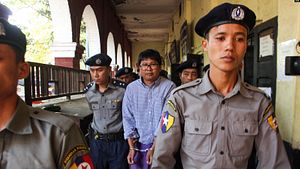Earlier this week, on April 23, Pulitzer prize winners Wa Lone and Kyaw Soe Oo lost their final appeal in Myanmar’s Supreme Court. The top court upheld seven-year prison sentences for the Reuters journalists for their reporting on the Burmese military crackdown on Rohingya Muslims.
The country’s most senior court did not elaborate on the reason for its decision, reports Reuters.
Before they were arrested, Wa Lone and Kyaw Soe Oo were investigating the killing of 10 Rohingya villagers — two of them high school students — in Myanmar’s Inn Dinn village. Their report for Reuters recreated the events of the massacre and shed light on the involvement of Myanmar’s troops in the mass killings.
Last year, the military said that the seven soldiers involved in the killing of Rohingyas in Inn Dinn were sentenced to 10 years in prison with hard labor for “contributing and participating in murder” of the 10 men.
Since 2017, more than 700,000 Rohingya, largely from Myanmar’s Rakhine state, have fled to Bangladesh. Bangladesh presently holds over 1 million Rohingya refugees, those fleeing the 2017 military violence joining others who had fled in earlier cycles of persecution.
UN officials have called the treatment of Rohingyas a “textbook case of ethnic cleansing.” A UN fact-finding mission accuses Myanmar’s army generals of “genocidal intent” and calls for prosecution of Min Aung Hlaing, Myanmar’s commander-in-chief, and other top military generals for genocide under international law.
Wa Lone and Kyaw Soe Oo were arrested in December 2017 and sentenced in September 2018 for violation of Section 3.1 of the Official Secrets Act. The Official Secrets Act is a colonial-era law, created by the British government in 1923 to criminalize the sharing of any information that “might be or is intended to be, directly or indirectly, useful to an enemy.” Its use in other post-colonial nations like Malaysia and India to silence dissidents, journalists and whistleblowers, is broadly criticized.
Wa Lone and Kyaw Soe Oo denied the accusations and pled not guilty. Their earlier appeal to the Yangon High Court was rejected in January 2019.
“Wa Lone and Kyaw Soe Oo did not commit any crime, nor was there any proof that they did,” said Gail Gove, Reuters chief counsel, in a statement after the Supreme Court ruling. “Instead, they were victims of a police setup to silence their truthful reporting. We will continue to do all we can to free them as soon as possible.”
According to NPR, the prosecution witness who testified that the police planted evidence on the two reporters was sentenced to one year for violating the Police Disciplinary Act.
April 25 marked 500 days since the two journalists were arrested.
There has been a global appeal to the country’s civilian leader, Aung San Suu Kyi, who once fought for the same right to freedom of expression against the Myanmar’s military junta rule. The Nobel laureate has still to respond to the Supreme Court’s verdict.
Despite the National League for Democracy (NLD)’s promises to protect a free press in the 2015 elections, a report by the Human Rights Watch in January 2019, found that “freedom of expression in Myanmar is deteriorating, directly affecting a wide range of people, from Facebook users critical of officials to students performing a satirical anti-war play. Domestic journalists are particularly at risk.”
Myanmar was ruled by military junta for decades until 2011 and the prosecution of the Reuters journalists has become an important test for the young but fledgeling democracy. Despite its transition to democratic governance, the military continues to control many key government institutions and is guaranteed 25 percent of parliamentary seats.
While Myanmar rose 20 places in Reporters Without Borders World Press Freedom Index from 2013 to 2017, the course has shifted since the 2017 Rohingya crackdown and a reverse trend is now taking hold in Yangon. The subject of military’s treatment of the Rohingyas is heavily censored in the media, to the point that even the term “Rohingya” is officially banned.
There is an alarming inclination of similar arrests and detentions in the past weeks, reports Radio Free Asia: Min Htin Ko Ko Gyi, film director and founder of the Myanmar Human Rights, Human Dignity International Film Festival, was detained in connection with Facebook posts critical of the military and the 2008 Constitution on April 12; Ye Ni, editor of The Irrawaddy’s Burmese section had a case opened against him for an article that the military deemed was “one-sided;” and in mid-April, five youngsters were taken into custody after they live-streamed a satirical Thangyat performance mocking the Myanmar military.
Bansari Kamdar is a freelance journalist and researcher presently based in Boston, MA. She specializes in South Asian political economy and security issues.

































